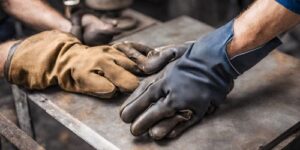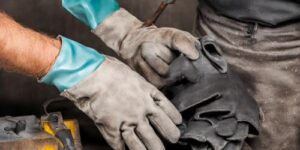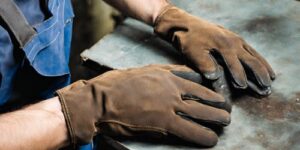Table of Contents
- Importance of Clean Welding Gloves
- Prolonging the Lifespan of Welding Gloves
- 1. Signs Your Welding Gloves Need Cleaning
- 2. Preparing to Clean Welding Gloves
- 3. Cleaning Methods
- 4. Drying Techniques
- 5. Maintaining Welding Gloves
- 6. When to Replace Welding Gloves
- 7. DIY Cleaning vs. Professional Services
- How do you clean dirty work gloves?
- Can You Wash Welding Leather?
- Conclusion
- FAQ About How to Clean Welding Gloves
Welding gloves are a crucial piece of safety equipment for welders, providing protection against burns, sparks, and other potential hazards. However, their effectiveness can diminish over time without proper care. In this guide, we’ll explore the importance of keeping your welding gloves clean and well-maintained.
Importance of Clean Welding Gloves
Clean welding gloves are not just about aesthetics; they directly impact safety and performance. Dirty gloves can compromise the welder’s grip, reducing control and precision during work. Moreover, neglected gloves may wear out faster, leading to potential safety hazards.
Prolonging the Lifespan of Welding Gloves
Regular cleaning not only ensures safety but also extends the lifespan of your welding gloves. As an investment in your protection, it’s essential to know when and how to clean them properly.
1. Signs Your Welding Gloves Need Cleaning
- Visible Dirt and Grime
The most apparent sign is visible dirt on your gloves. Welding environments are notorious for debris, and a layer of grime can hinder your gloves’ performance.
- Reduced Flexibility
If your gloves feel stiff and less flexible, it’s a clear indication that they need cleaning. Flexible gloves are crucial for maneuverability during welding tasks.
- Lingering Odor
Unpleasant odors indicate the presence of bacteria and contaminants. Ignoring these smells could lead to skin irritation and compromise your safety.
2. Preparing to Clean Welding Gloves
- Gather the necessary materials.
Before diving into cleaning, gather materials such as mild soap, water, a soft brush, and a clean cloth. Having everything ready streamlines the process.
- Checking Manufacturer Guidelines
Always refer to the manufacturer’s guidelines. Some gloves may have specific cleaning instructions or materials to avoid.
3. Cleaning Methods
1. Soap and Water Solution
Step-by-Step Guide
- Mix mild soap with water.
- Dip the gloves in the solution.
- Gently scrub with a soft brush.
- Rinse thoroughly and air dry.
2. Vinegar and Baking Soda Mixture
- Benefits of Natural Cleaners
- Natural cleaners eliminate odors.
- Baking soda acts as a gentle abrasive for deep cleaning.
3. Leather-Specific Cleaning
- Avoiding Common Pitfalls
- Use leather-specific cleaners.
- Avoid using strong chemicals that may harm the material.
4. Drying Techniques
- Air Drying
Allow your gloves to air dry to prevent damage from excessive heat.
- Using a Fan or Dryer
For faster drying, use a fan or set the dryer on low heat. Avoid high heat to prevent material damage.
- Tips for Faster Drying
Stuff gloves with newspaper to absorb moisture and speed up the drying process.
5. Maintaining Welding Gloves
- Regular Inspection
Periodically inspect your gloves for signs of wear and tear, addressing issues promptly.
- Applying Conditioners
Use leather conditioners to keep the material supple and resistant to cracking.
- Storage Tips
Keep your gloves in a cool, dry spot away from direct sunlight to avoid them getting damaged.
6. When to Replace Welding Gloves
- Signs of Irreparable Damage
If you notice holes, tears, or significant wear, it’s time to replace your gloves to maintain optimal safety.
- Importance of Safety in Welding
Never compromise safety. If gloves are beyond cleaning or repairing, invest in new ones to ensure protection during welding activities.
7. DIY Cleaning vs. Professional Services
- Cost-Effective Solutions
DIY cleaning is cost-effective and can be done regularly to maintain glove performance.
- Professional Cleaning Benefits
Professional cleaning services may be necessary for heavily soiled or specialized gloves, ensuring a thorough and expertly executed cleaning process.
How do you clean dirty work gloves?
Cleaning dirty work gloves is a crucial step in maintaining their durability and effectiveness. Follow these steps to ensure your welding gloves stay in top condition:
- Brush Off Loose Debris: Begin by gently brushing off any loose dirt or debris from the surface of the gloves. This will prevent abrasive particles from scratching the material during the cleaning process.
- Spot Cleaning: For localized stains or spots, use a damp cloth or sponge with mild soap to gently clean the affected areas. Avoid using harsh chemicals, as they may damage the leather or other materials.
- Hand Washing: Depending on the material of your welding gloves, you can hand wash them using a mild detergent. Submerge the gloves in a bucket of soapy water and gently scrub with a soft brush. Rinse thoroughly to remove all soap residues.
- Air Drying: After cleaning, allow the gloves to air dry completely. Avoid exposing them to direct sunlight or using heat sources like hairdryers, as excessive heat can cause the leather to become brittle.
Can You Wash Welding Leather?
Yes, you can wash welding leather, but it requires careful attention to prevent damage. Follow these steps:
- Check the Label: Before washing, check the manufacturer’s instructions on the label. Some welding gloves may have specific cleaning recommendations.
- Use a Damp Cloth: Wipe the leather with a damp cloth to remove surface dirt. For tough stains, use a gentle soap or cleaner specifically made for leather.
- Air Dry Only: Never use heat to dry leather. Let the gloves air-dry at room temperature. Stuffing them with newspaper can help them maintain their shape while drying.
Conclusion
In conclusion, knowing how to clean welding gloves is essential for both the safety and longevity of your gear. By following the proper cleaning methods and addressing issues promptly, you ensure that your gloves remain a reliable companion in your welding endeavors. Keep your gear clean, stay safe, and enjoy optimal performance.
FAQ About How to Clean Welding Gloves
Can I clean all types of welding gloves the same way?
Cleaning methods vary based on glove materials. Refer to manufacturer guidelines for specific instructions.
How often should I clean my welding gloves?
Regular cleaning is recommended, especially after heavy use or exposure to contaminants.
Can I use household cleaner on welding gloves?
Mild household cleaners are generally safe, but always check for manufacturer recommendations to avoid damage.
Are there specific cleaners for leather welding gloves
Yes, leather-specific cleaners are available. Using them ensures the longevity of your leather welding gloves.
Is it possible to overclean welding gloves?
While regular cleaning is essential, overcleaning may accelerate wear. Follow the manufacturer’s guidelines for optimal care.














4 thoughts on “How to Clean Welding Gloves: A Step-by-Step Guide”